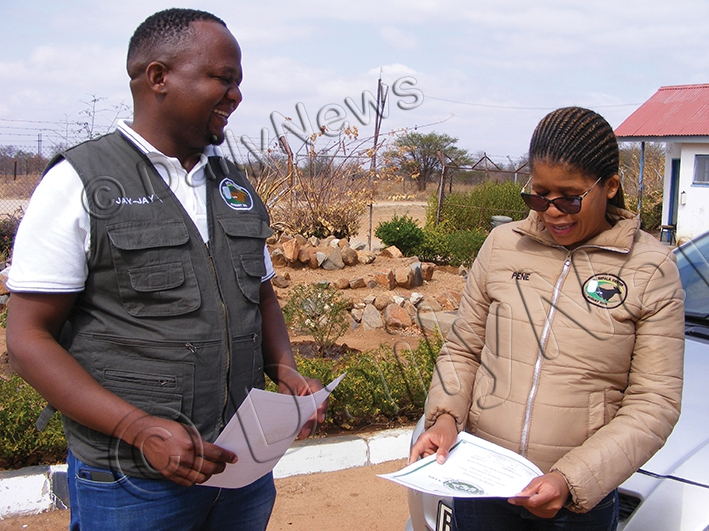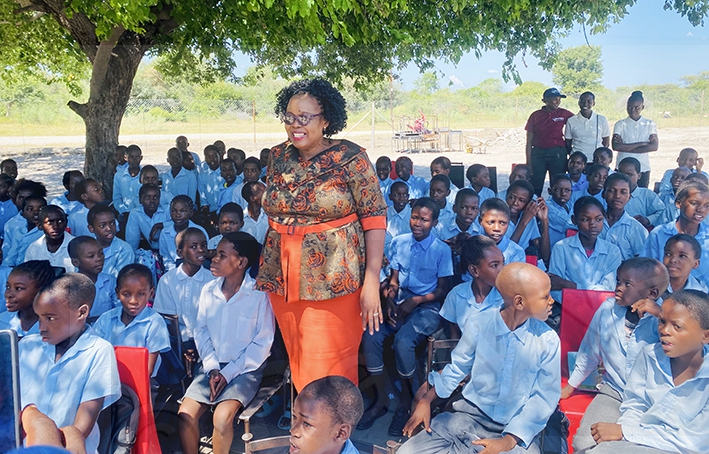Reduced AI training fees aids new generation of experts
22 Sep 2024
President, Dr Mokgweetsi Masisi’s vision for a digital-driven future has been clear as the sky since he took office in 2018.
Like a farmer tilling the soil, he laid the groundwork for technological innovation, and the decision to reduce Artificial Insemination (AI) training fees is the latest fruit of his labour.
With the reduction of the training fees, Botswana has signaled a new generation of Jonathan Millers. A crop of AI experts, each with the expertise and know-how to transform the livestock breeding industry, is poised to blossom in Botswana.
The future of Botswana’s farming industry is looking brighter than ever, as the government strategic move paves way for its citizens to seize the reins of the AI revolution and become a global leader in this rapidly growing field.
In Botswana, a new seed of progress is sprouting. Artificial Insemination, once a technological pipedream, has been carefully planted and nourished by the government’s decision to reduced training fees.
“This bold move is not just a spark of inspiration, but a flame that will ignite a new era of economic growth, a flourishing digital revolution that will propel Botswana’s economy forward at breakneck speed, leaving a trail of progress in its wake,” said principal scientific officer in the Ministry of Agriculture.
Ms Loungo Phiri explained that the global demand for AI mobile services was growing, with countries around the world clamoring for cutting-edge technology to revolutionalise their livestock breeding practices. And now, Botswana has entered the fray, staking its claim on the international stage.
She said the implementation of the Revised Artificial Insemination Programme by the Ministry of Agriculture had intensified training on artificial insemination techniques to farmers as one of the drivers of the programme.
“The intensified training was achieved through subsidising training costs from P6 140 to P500 flat fee per participant, increasing the number of training course frequencies from twice per year to monthly and increasing participant number per intake from 20 to 40,” she added.
She explained that the results of such a move had been a huge influx of applications from members of the public who want to undergo training in order to acquire Artificial Insemination skills.
She indicated that the Impala Research and Training Centre near Francistown had already graduated its first batch of 19 inseminators, four females and 15 males, each paying a flat fee of P500 to cover registration, training as well as boarding fees, inclusive of meals. The second batch is still undergoing training.
Ms Phiri stated that since December 2023, a total of 212 participants had received training on Artificial Insemination Techniques at Ramatlabama National Artificial Insemination Laboratory and Training Centre while there was a total of 290 applicants on the training waiting list.
She said it was against this backdrop that the government decided to open another training space at Impala Rural and Training Centre to spread its wings to the northern part of Botswana.
She explained that having another training site was therefore crucial in order to address the backlog of applicants.
“Impala is as such proposed to serve as another AI Training Centre alongside Ramatlabama. Once the second Training Centre is operational, the backlog on training participants can then be cleared in half the time, which is three or four-month period,” she said.
Ms Phiri said to operate Impala as another training centre, would however require the use of Impala Rural Training Centre for theory teaching, accommodation and meals while practical lessons will be carried out at Impala ranch.
She said the Impala ranch had a total area of 1 600 hectares and out of this, 40 hectares belong to National Agricultural Research Development Institute while the rest is for Department of Animal Production.
Ms Phiri said with a strategic reduction in AI training fees, the government has cleared a way for farmers to tap into this lucrative industry, becoming AI service providers and unlocking new revenue streams in the process.
“This move is more than just a financial boast; it is a vote of confidence in the untapped potential of Botswana’s farming community,” she said, adding that the graduates can venture into the AI mobile services.
One of the graduates, Mr Jonathan Kebopetswe of Molepolole said the government had taken a giant leap forward in fostering a thriving livestock breeding sector, setting the stage for a new era of opportunity.
“This is evidenced by the once prohibitive training fee for AI, which has been slashed to a mere P500, a monumental move that signals the government’s commitment to encouraging the growth of AI mobile services as a viable business option for farmers,” said Mr Kebopetswe, who is also undergoing training in Bible Theology.
He said while the initial sticker shock of the training fee may have deterred many aspiration livestock breeders in the past, the new development opened a gateway to a lucrative industry that could revolutionalise cattle breeding practices and profitability.
“The potential for AI mobile services is staggering, with breeders now able to bring their expertise to the doorstep of farmers, unlocking a world of possibilities for enhanced herd genetics and productivity,” he added.
Mr Kebopetswe said his increased accessibility to AI services could also pave way for an influx of new, talented individuals eager to capitalise on this booming opportunity.
He hinted that the reduction was not a knee-jerk reaction, but a calculated move by the government, designed to catalyse growth and innovation within the livestock breeding sector.
Mr Kebopetswe said by slashing the AI training fee, the government was not just handing out freebies, but was investing in the future of Botswana’ farming community, paving a way for Batswana farmers to curve out a competitive edge in the burgeoning AI market.
This bold decision, he explained, sent a clear message that Botswana was ready to take its place as a leader in the AI revolution, transforming its farming industry and unlocking its true potential.
Another certified graduate, Ms Kolobetso Bakae from Serowe said the decision by government to reduce AI training fees couldn’t have come at a better time.
Ms Bakae said she heard about the reduction of fees by President Masisi during a field day at Letlhareng farm and immediately made a decision and registered at Ramatlabama National Artificial Insemination Laboratory and Training Centre.
As an enterprising farmer, Ms Bakae had been eyeing the lucrative AI mobile services market for months, but the steep training cost had been a major barrier.
“I was on the verge of giving up on my dream of entering the AI industry.
But then, the government announced the reduction in fees, and everything changed. I saw it as a sign that the time was finally right to seize this opportunity,” she said.
Ms Bakae said she was going to buy all the necessary AI equipment and start her own mobile AI service shop, where she promises charge a reasonable per cow.
“I will do this as a business and I would also want to empower other women to join the AI industry because I have realised that it has quick returns,” she added.
The future of Botswana’s farming industry is looking brighter than ever, as the government’s strategic move paves way for its citizens to seize the reins of the AI revolution and become a global leader in the rapidly growing field. ENDS
Source : BOPA
Author : Thamani Shabani
Location : FRANCISTOWN
Event : Development news
Date : 22 Sep 2024






